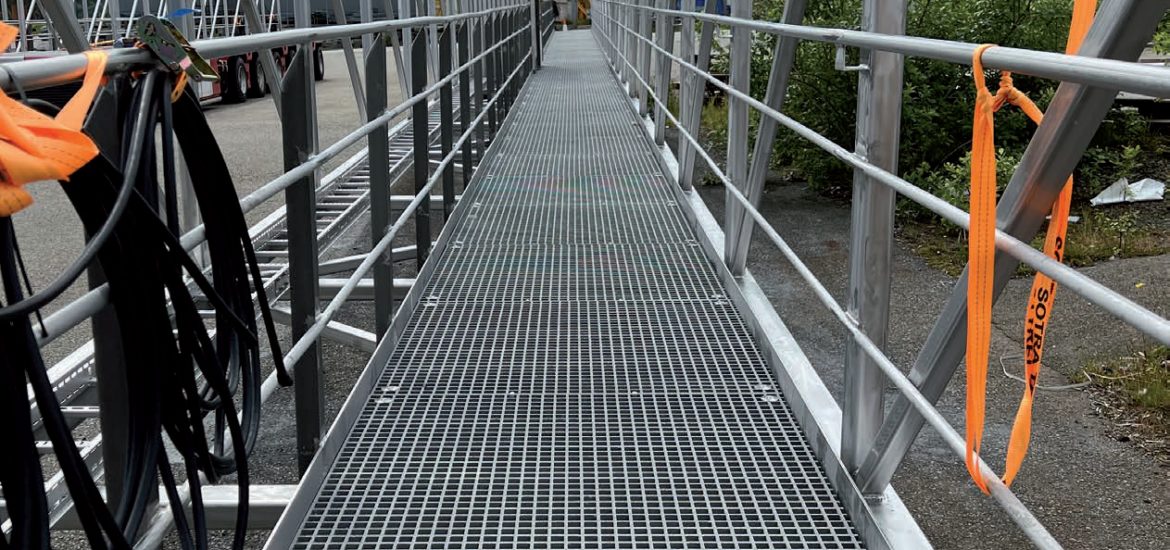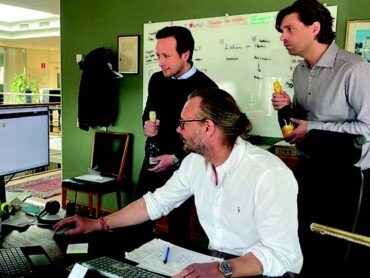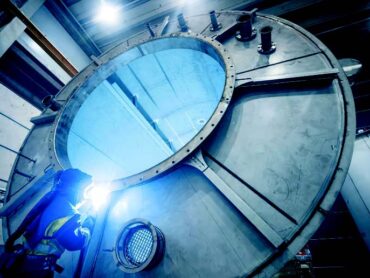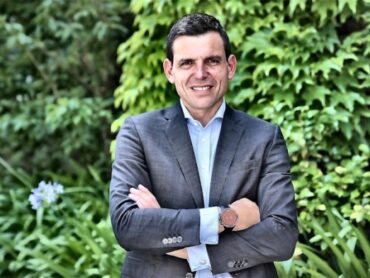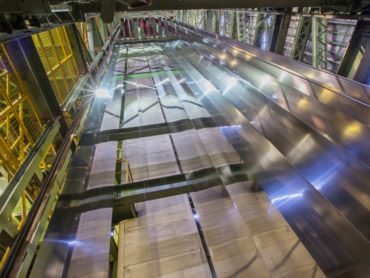In the autumn of 2020, Sverdrup Steel’s partner, Fabtech, was commissioned by Equinor to build footbridges to replace the existing footbridges on the Mongstad facility in Norway. The pre-existing bridges were constructed in painted carbon steel.
Sverdrup wanted to challenge the existing solution and replace the carbon steel with Lean Duplex as a more sustainable and durable solution. With the use of Lean Duplex it is possible to have a lighter structure, less maintenance, and reduce the CO2 footprint.
With good assistance from Sverdrup’s technical team of metallurgists and the availability of material, the change from carbon steel to Lean Duplex was a foregone conclusion.
The selected material grade was Lean Duplex according to EN 1.4362/UNS S32304 in accordance with NORSOK M:120 – MDS YD37. Sverdrup Steel supplied over 2,000 metres of structural hollow sections, in addition to plates and hot rolled angle bars. All the items were provided in Lean Duplex and delivered from the company’s site in Kløfta, Norway.
The advantages of Lean Duplex include:
- High strength
- Good corrosion resistance
- More predictable price level
- Good fatigue strength
- More than 30% weight saving on most applications
- Low life cycle cost due to no need of regular painting
- 100% recyclable and made from more than 85% recycled material
Although the bridges were built in 2021, the installation did not occur before June 2022 due to rough weather conditions.
The project partners
Sverdrup Steel has amassed unique know-how and knowledge through the years as a leading specialist in high-performance alloys. Its technical department can advise customers on a range of technical topics.
The company specializes and stocks a large inventory of cold and hot rolled coils, plates and bars in Duplex grades to be shipped all over the world.
Fabtech undertakes fabrication of steel structures for
a wide range of customers and applications. The complexity ranges from simple structures in carbon steel to complicated structures for subsea equipment with demanding tolerances and specifications.
It can supply steel structures in all material grades. Whilst usually supplying carbon steel, painted or galvanized, according to specification, many customers also choose stainless steel 316L or aluminium, and the company is also happy to supply constructions in other material qualities, such as duplex or titanium, when customers have special needs. The company has approved welding procedures for the vast majority of material qualities and combinations of these.
Equinor, meanwhile, is an international energy company committed to long-term value creation in a low-carbon future. Its purpose is to turn natural resources into energy for people and progress for society. Equinor’s portfolio of projects encompasses oil and gas, renewables and low-carbon solutions, with an ambition of becoming a net-zero energy company by 2050. Headquartered in Stavanger, Norway, Equinor is the leading operator on the Norwegian continental shelf. It is present in around 30 countries worldwide.
Equinor has several involvements at the Mongstad Industrial Park through the oil refinery, Technology Centre Mongstad, NGL processing plant (Vestprosess), crude oil terminal, and the supply base.
The Mongstad refinery is the largest in Norway and plays a key role in the treatment of oil and gas from the Norwegian continental shelf. The refinery was opened for operations in 1975 and the facility was expanded in 1989, increasing the process capacity from 6.5 to 8 million tonnes of crude oil per year.
Products are exported to continental Europe, North America and Asia, and are used as fuel for transport, heating, electricity generation and as industrial feedstock. Annual petrol production is equivalent to four times Norwegian domestic consumption.
The refinery at Mongstad has approximately 750 highly-skilled professionals within different technical disciplines. During normal operations, around 300 external supplier staff are engaged each year, mainly within maintenance, modification, catering, cleaning and guard and security services.
A large part of Equinor-produced crude oil is stored temporarily at the Mongstad terminal prior to export, arriving through two pipelines from Troll B and Troll C and connected oil fields.

